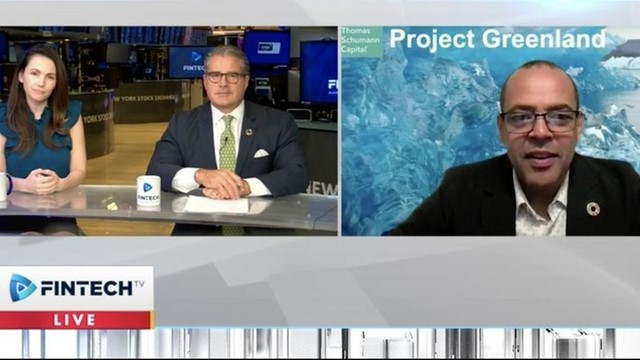Thomas Schumann Capital (TSC), one of the world’s leading solutions provider for Water Security & Capital Markets yesterday (4 October, 2022) announced live in an interview at the New York Stock Exchange (NYSE) Project Greenland’s start of exporting the world’s purest water which is free of toxins, PFAS, micro plastics, chemicals, pesticides, herbicides and other contaminants.
Project Greenland is the first of its kind — an environmentally, socially and financially responsible venture that captures, banks, and exports Greenland’s pristine ice melt freshwater surplus as super premium drinking, agricultural and industrial Water to Water-scarce regions like the Middle East and North Africa (MENA), Texas, California and Europe.
Greenland’s Water is a unique untouched resource in its purest form free of toxins, micro plastics, chemicals, PFAS, contaminants found in almost every conventional Water supply today. Project Greenland provides off-takers the opportunity to option up to 17 trillion Liters or purchase Greenland Water in bottles, semi-bulk Flexitanks with 26,000 Liters and bulk shipments starting at 40,000,000 Liters.
The Greenland Ice Sheet is rapidly melting due to a warming climate, making Greenland also a significant contributor to sea-level rise. In 2019, 532 trillion litres of freshwater were lost to the oceans as a result of Greenland glacier melt. The resulting increase in sea level threatens coastal properties, businesses and livelihoods. By banking, storing and transferring the melting ice Water, Project Greenland mitigates sea level rise and global Water scarcity while also growing Greenland’s economy, providing health and wealth to water-stressed states, countries, nations.
As the sustainable, responsible and economic alternative to desalination Project Greenland exhibits a low-carbon footprint while advancing both United Nations Sustainable Development Goal 6 “Ensure access to Water for All” and SDG 13 “Take urgent action to combat climate change and its impacts”.
Schumann states: “Desalination requires years of designing, permitting, construction, comes with very high energy and capital use, and endangers ocean and marine life through the discharge of large amounts of brine which increases salinity. Desalinated Water is of very low quality for human and agricultural consumption, is effectively a dead liquid, lacking important nutrients and minerals living organisms and crops require for energy and vitality. Factoring in the immense costs and timeline desalination plants require general starting in the hundreds of millions of dollars the price per Liter of desalinated Water far exceeds Greenland’s offering.”
“This need-based reallocation helps balance the global Water supply while ensuring sustainable, positive impact and profit for stakeholders alike,” said Thomas Schumann, founder of Thomas Schumann Capital. “Project Greenland’s equitable Water banking and distribution saves lives, societies, economies and GDP, improving the wellbeing, health and wealth in MENA and other vulnerable regions.”



